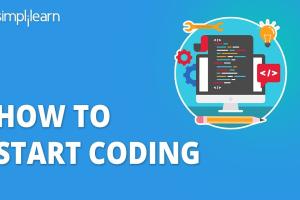The Ultimate Beginner's Guide to Programming: How to Start Coding Today

-
Quick Links:
- 1. Introduction
- 2. Why Learn Coding?
- 3. Choosing a Programming Language
- 4. Setting Up Your Development Environment
- 5. Learning Resources
- 6. Coding Practice and Projects
- 7. Engaging with the Coding Community
- 8. Case Studies
- 9. Common Challenges and Solutions
- 10. Conclusion
- 11. FAQs
1. Introduction
In today's digital age, coding is becoming an increasingly essential skill. From mobile apps to websites, the demand for programming knowledge is skyrocketing. But where do you start? This guide is designed to help absolute beginners navigate the world of programming, providing clear pathways and resources to kickstart your coding journey.
2. Why Learn Coding?
Coding is not just about building software; it’s about problem-solving and logical thinking. Here are some compelling reasons to learn coding:
- Career Opportunities: Many high-paying jobs require coding skills.
- Creativity: Coding allows you to create unique projects and express your ideas through technology.
- Flexibility: With coding skills, you can work remotely or freelance.
- Problem Solving: Coding enhances your analytical skills and logical thinking.
3. Choosing a Programming Language
When starting to code, selecting the right programming language is crucial. Here are some popular choices:
- Python: Great for beginners due to its readability and simplicity.
- JavaScript: Essential for web development; allows you to create interactive websites.
- Java: Widely used in enterprise environments and for Android app development.
- C++: Useful for system/software development and game programming.
4. Setting Up Your Development Environment
Before you start coding, you need to set up your development environment. Here’s how:
- Choose a code editor such as Visual Studio Code or PyCharm.
- Install necessary software and libraries specific to your chosen programming language.
- Familiarize yourself with version control systems like Git.
5. Learning Resources
There are countless resources available to help you learn coding. Here are some recommended platforms:
- Codecademy - Interactive coding tutorials.
- FreeCodeCamp - Free coding bootcamp.
- Udemy - Online courses on various programming topics.
- Khan Academy - Free educational resources.
6. Coding Practice and Projects
Hands-on practice is essential for mastering coding. Here’s how to get started:
- Work on simple projects like calculators, to-do lists, or personal websites.
- Participate in coding challenges on platforms like HackerRank or LeetCode.
- Create a GitHub account to showcase your projects and collaborate with others.
7. Engaging with the Coding Community
Joining a community can provide support and motivation. Consider these options:
- Participate in online forums such as Stack Overflow.
- Attend local meetups or coding boot camps.
- Join social media groups focused on programming.
8. Case Studies
Learning from others’ experiences can be invaluable. Here are two inspiring case studies:
Case Study 1: From Novice to Developer
Meet Sarah, who began coding at 28. With dedication, she transitioned from a career in marketing to become a software developer in less than a year. She utilized online courses and built a portfolio of projects that landed her a job at a tech startup.
Case Study 2: The Self-Taught Programmer
John was a high school dropout who learned coding through YouTube tutorials and online forums. Within two years, he established his own web development agency, showcasing the power of self-motivation and community support.
9. Common Challenges and Solutions
Every beginner faces challenges. Here are some common ones and how to overcome them:
- Feeling Overwhelmed: Start with simple projects and gradually increase complexity.
- Debugging Issues: Use debugging tools and online forums for support.
- Lack of Motivation: Set small, achievable goals and celebrate milestones.
10. Conclusion
Starting your coding journey can be daunting, but with the right tools, resources, and mindset, you can become proficient in programming. Remember to practice regularly, seek help when needed, and engage with the community. Your coding adventure awaits!
11. FAQs
1. What is the best programming language for beginners?
Python is widely regarded as the best language for beginners due to its simplicity and readability.
2. How long does it take to learn coding?
The time it takes to learn coding varies by individual and goals, but many can learn the basics in a few months.
3. Do I need a degree to become a programmer?
No, many successful programmers are self-taught or have attended coding boot camps.
4. What resources are best for learning coding?
Online platforms like Codecademy, FreeCodeCamp, and Udemy offer great resources for learning coding.
5. Is coding difficult?
Coding can be challenging, especially at first, but with practice, it becomes easier.
6. Can I learn coding for free?
Yes, there are numerous free resources, including online tutorials and forums.
7. What is the difference between front-end and back-end development?
Front-end development focuses on the user interface and experience, while back-end development deals with server-side logic and databases.
8. How do I stay motivated while learning to code?
Set realistic goals, join a community, and work on projects that interest you to stay motivated.
9. What can I build as a beginner?
Start with simple projects like calculators, to-do lists, or personal websites.
10. How important is practice in learning coding?
Practice is essential in coding; the more you code, the better you get.
Random Reads
- How to make sims inspired in the sims 4
- Mastering weapon enchantment esonline
- Mastering windows command prompt python
- How to block ads on google chrome
- How to upload a file
- How to upload files on mediafire
- How to block a contact on outlook mail
- How to delete zoosk account
- How to delete your gmail account
- How to turn off message notifications on iphone